Identity-First Language Autism: Why It Matters
- Elle Dee

- Nov 11, 2025
- 3 min read
Updated: Jan 3
The weight of a single word
Language does more than share information.
It builds the world around us.

And in the identity-first language autism conversation, those tiny word choices—Autistic person or person with autism—carry more than grammar. They carry belonging, dignity, and whether the people hearing us will understand who we really are.
For me, this isn’t a style debate.
It’s about truth.
It’s about whether the words I use let me exist fully inside them.
When I Say I’m Autistic
When I say I’m Autistic, I’m not offering a diagnosis.
I’m offering context.
It tells you something about how my mind organizes sound and pattern, how I process emotion, how I find calm, how I recover. Autism isn’t something I keep in a box, separate from my selfhood. It is the selfhood.
That’s why identity-first language feels like home to me.
It doesn’t shrink or sanitize. It doesn’t make me something to “see past.”
It lets me take up space as I am.

Understanding the Other Side
I know where person with autism comes from.
Most people who use it are trying to be kind.
They want to center humanity—to make sure no one forgets there’s a person there. For parents and professionals, it can sound like protection. They’ve seen the word autism twisted into insult, and they’re fighting to keep that cruelty from touching the person they love.
I get that. Truly.
There’s love in that choice.
There’s fear too.
The Space Between Words
But love isn’t always the same as closeness.
When you separate a person from their wiring—say they have autism instead of are Autistic—it creates a quiet distance. A suggestion that the autism is an unfortunate tag-along, something detachable.
That space hurts more than people realize.
Because if you took away the autism, you wouldn’t just change my traits. You’d erase me.
Identity-first language says: this isn’t a flaw to peel off. It’s the texture of my being. It’s what makes my thinking vivid, my empathy strange and deep, my world both overwhelming and beautiful.

Where We Already Agree
Here’s the thing—most of us are actually on the same side.
• We don’t want autistic people described as “suffering from” autism.
• We want language that carries respect.
• We want our humanity intact.
The difference is in how we think respect sounds. Some feel it means putting sameness first. Others, like me, find it in the honesty of difference.
Why This Still Matters
I don’t expect everyone to switch overnight.
But I do hope people pause before speaking for us.
Because language isn’t neutral—it teaches people how to treat us. It shapes how we’re remembered, how we’re believed, how we’re allowed to exist.
When I call myself Autistic, I’m not making myself smaller. I’m finally letting myself be whole.

The Bridge We Can Build
Conversations about language can get loud, sharp, defensive.
But if we let them soften, they can also be holy ground—where we finally see each other.
At its best, language isn’t about being right. It’s about reaching.
It’s how we meet in the middle.
So if your phrasing looks different than mine, tell me why.
I’ll listen.
Maybe this time, we both will.
What Naming Gives Us
Language can diminish us—or it can free us.
When I say I’m Autistic, I’m not defining myself by limitation.
I’m claiming my shape.
And that, to me, is what this whole conversation has always been about:
finding words that let us stay true, without apology.
-Elle
Want to keep exploring beyond identity-first language: autism?
This space is still new, but it’s already full of big questions, half-formed truths, and stories that might sound a little like yours. If you’re curious where to go next, here are a few places to wander:
Or, if you just want to be here quietly, you can join the list and I’ll send new things your way when they’re ready. No pressure. No performance. I love that you’re here. |


Comments